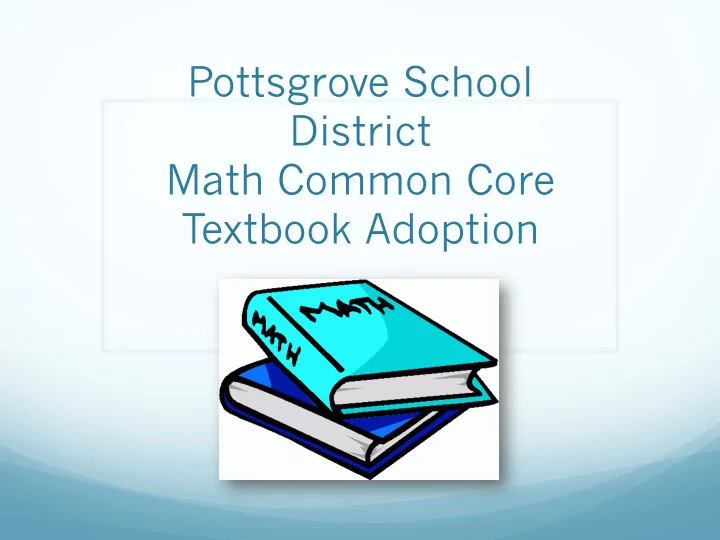

Pottsgrove School District Math Common Core Textbook Adoption
Common Core State Standards for Mathematics More rigorous and demanding for students Greater focus on learning for understanding Requires application of math in real world situations Prepares students for “college and career readiness”
Common Core Math Curriculum Content Standards Describes WHAT students will learn at each grade level Practice Standards Describes HOW students will learn
Standards for Mathematical Practice Describes how students will learn mathematics Helps students develop conceptual content Tested on PSSA and Keystone Exams
Standards for Math Practice Students will: Make sense of problems Persevere in solving them Reason abstractly and quantitatively Construct viable arguments Critique the reasoning of others Model with mathematics Use appropriate tools strategically Attend to precision Look for and make use of structure Look for and express regularity in repeated reasoning
Conceptual Learning occurs when students use the practice standards to understand the content through “productive struggle”
Productive Struggle “Process of thinking, making sense, and persevering in the face of not knowing exactly how to proceed or whether a particular approach will work”
Martha’s Ms. Brown’s Class Carpeting Ms. Brown’s class will raise rabbits for their Martha was spring science fair. re-carpeting her They have 24 feet of bedroom, which was fencing to build a 15 feet long and 10 rectangular rabbit feet wide. How pen to keep the rabbits. If Ms. many square feet of Brown’s students carpeting will she want their rabbits to need to purchase? have as much room as possible, how long would each of the sides of the pen be?
What Does This Mean for Classroom Instruction and Resources? The teacher Provides students with “productive struggle” through high-cognitive, demanding tasks Offers opportunities for students to engage in math conversation to foster collaboration Becomes a facilitator of math thinking and understanding by asking questions to help guide student thinking
Pottsgrove’s Challenge Investigate and select student and teacher resources that: Create a vertical K-12 articulation Align to Common Core Content and Practices Create “productive struggle” Provide effective professional development for teachers
Pottsgrove’s Alignment Process Teachers, administrators, and coaches conducted a search of National Science Foundation Programs under the guidance of Dr. Diane Briars, President Elect of the National Council Teachers of Mathematics.
Elementary Process Everyday Math (EDM) Researched-based program developed by the University of Chicago School of Mathematics Project. Aligned to the Standards for Mathematical Practices from the beginning (First Edition 1998, Second Edition 2002, Third Edition 2007) Currently realigning the newest edition to the Common Core Math Standards (2012 Edition)
Elementary Process EDM Pilot 13 elementary teachers trained by EDM specialist to pilot a unit at every grade level Teachers analyzed the program and completed a program effectiveness survey Committee Meeting and Discussion Overwhelming support for the adoption of the Common Core edition of EDM to support student learning and mathematical understanding
Middle School Process Connected Math National Science funded program (1991, 1997, 2013) Problem-Centered Students develop understanding and skill as they explore the problems individually, in a small groups, and with the class Cognitive Tutor Provides students with learning experiences that address their individual learning needs
Middle School Connected Math Pilot Math teachers selected the Connected Math and Cognitive Tutor programs. They received training from specialists from both programs and piloted a unit of study in each grade level Meeting and Discussion Overwhelming support for the adoption of the Connected Math program to support student learning and mathematical understanding
High School Process National Science Foundation Programs College Prep Math Kendall Hunt Agile Minds Carnegie Learning Teachers participated in presentations and surveys about each program
High School Process Carnegie Learning Program Developed by cognitive and computer scientists from Carnegie Mellon University working in conjunction with practicing math teachers Written from the ground up and aligned to Common Core Content and Practice Standards Provides students with “productive struggle” Offers textbook and Cognitive Tutor resources
High School Process Agile Minds Intensified Algebra Program Developed through a collaboration of Charles A. Dana Center at the University of Texas and the University of Illinois Funded by National Science Foundation, Searle Funds of Chicago Community Trust, Bill and Melinda Gates Foundation, and the Carnegie Corporation of New York
High School Process Agile Minds Intensified Algebra Program Helps students who are one to two years behind become successful in algebra within one academic year (intervention program) Targets conceptual understanding and related problem-solving and reasoning capabilities Routines are built in for success
High School Process Meeting and Discussion Consensus for the adoption of the Carnegie Learning for Algebra I, Algebra 2, and Geometry Intensified Algebra program to support students who have one to two year learning gaps.
We Need Understanding….
“Students must learn mathematics with understanding, actively build new knowledge from experience and prior knowledge. ” (NCTM, 2000, p.20)
Recommend
More recommend